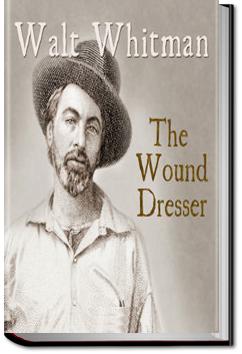UNLIMITED Audiobooks and eBooks
Over 40,000 books & works on all major devices
Get ALL YOU CAN for FREE for 30 days!
The Wound Dresser
Walt Whitman
Book Overview:
The Wound Dresser is a series of letters written from the hospitals in Washington by Walt Whitman during the War of the Rebellion to The New York Times, the Brooklyn Eagle and his mother, edited by Richard Maurice Burke, M.D., one of Whitman's literary executors.
The Wound Dresser is a series of letters written from the hospitals in Washington by Walt Whitman during the War of the Rebellion to The New York Times, the Brooklyn Eagle and his mother, edited by Richard Maurice Burke, M.D., one of Whitman's literary executors.
How does All You Can Books work?
All You Can Books gives you UNLIMITED access to over 40,000 Audiobooks, eBooks, and Foreign Language courses. Download as many audiobooks, ebooks, language audio courses, and language e-workbooks as you want during the FREE trial and it's all yours to keep even if you cancel during the FREE trial. The service works on any major device including computers, smartphones, music players, e-readers, and tablets. You can try the service for FREE for 30 days then it's just $19.99 per month after that. So for the price everyone else charges for just 1 book, we offer you UNLIMITED audio books, e-books and language courses to download and enjoy as you please. No restrictions.
He who goes among the soldiers with gifts, etc., must beware how he proceeds. It is much more of an art than one would imagine. They are not charity-patients, but American young men, of pride and independence. The spirit in which you treat them, and bestow your donations, is just as important as the gifts themselves; sometimes more so. Then there is continual discrimination necessary. Each case requires some peculiar adaptation to itself. It is very important[Pg 39] to slight nobody—not a single case. Some hospital visitors, especially the women, pick out the handsomest looking soldiers, or have a few for their pets. Of course some will attract you more than others, and some will need more attention than others; but be careful not to ignore any patient. A word, a friendly turn of the eye or touch of the hand in passing, if nothing more.
. . . Read More
Try now for FREE!

"Love your service - thanks so much for what you do!"
- Customer Cathryn Mazer
"I did not realize that you would have so many audio books I would enjoy"
- Customer Sharon Morrison
"For all my fellow Audio Book & E-Book regulars:
This is about as close to nirvana as I have found!"
- Twitter post from @bobbyekat



Community Reviews
Reading this only one word comes to mind: bodhisattva. Walt Whitman sits by the bed of dying soldiers during the Civil War and tries to comfort them as they die. He gives them money, fruit and even treats them to ice cream. He writes letters home for them, knowing that this letter will be the last w
2.5 Stars ⭐️ Forced to read this for school
Who hasn’t read and enjoyed the verse of one of America’s most beloved poets Walt Whitman? The Wound Dresser is as far afield of the poetry as one could imagine. When the Civil War broke out in 1861 Whitman was in his early forties and not in a position to join the fighting forces. He did go to Wash
Sad, but interesting
The Wound Dresser (1975) by Walt Whitman is a wonderful collection of articles and letters about Walt Whitman’s experiences volunteering as a nurse in the Civil War.
Whitman speaks of the brutal aftermath of the soldiers fighting in the war, which began in 1861, with honesty and compassion. He writes
“The Wound-Dresser” is one of Walt Whitman’s most powerful poems. Whitman worked as a nurse in Civil War hospitals in Washington, D.C., from 1862 to 1864; and his poem recounts in retrospect, and in a particularly moving manner, his experience of caring for desperately wounded young soldiers:
Thus in
Okay...
Interesting to get a view of the civil war from the grittiness of the hospital tents, and some of the historical elements were eye-opening.
But on the whole there was a lot of seeking attention from his mum, and I couldn’t help but feel that Christian missionaries offer more bedside comfort th
"I have seen now so much horrors that befal men, that I sometimes think I have grown callous—but, no, I don't think it is that, but nothing of ordinary misfortune seems as it used to, & death itself has lost all its terrors." ~ Walt Whitman; written during the Civil War often at the Old Patent Offic